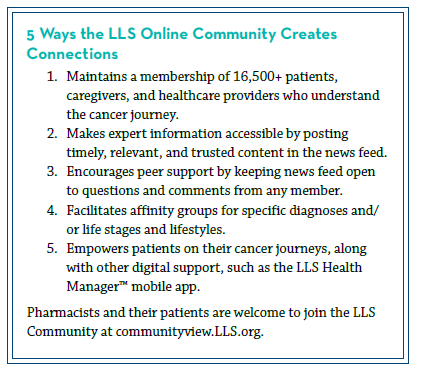Connection, Community, and Care Navigation through the Leukemia & Lymphoma Society
Laura Cannon, PharmD, MPH, BCOP
Clinical Assistant Professor and Oncology Pharmacist
The University of Texas at Austin College of Pharmacy and Dell Medical School Livestrong Cancer Institutes
Austin, TX
Marin Abousaud, PharmD, BCOP
Oncology Clinical Pharmacy Specialist, Head and Neck Cancer
Emory Healthcare, Winship Cancer Institute
Atlanta, GA
As humans, we are built for connection. We need it to provide support, foster growth, and share life’s ups and downs. The needs of a person with cancer are no different; in fact, their need for connection may be even more pronounced. However, finding someone who understands the cancer experience, and who can relate to specific concerns and provide validation, can be difficult. In addition, it is not always possible to find someone of similar age or diagnosis within your own hospital or even within your own community.
As pharmacists, we have all experienced the hunger patients and caregivers have for educational information and for someone to relate to their experiences. The Leukemia & Lymphoma Society® (LLS) is a patient advocacy organization that has identified this common gap and works to fill it by connecting patients and their loved ones to online support resources. The LLS mission is to “cure leukemia, lymphoma, Hodgkin’s disease and myeloma, and improve the quality of life of patients and their families.”
LLS Community: Virtual Support in Real Life
LLS Community connects more than 16,500 patients, caregivers, and healthcare providers through an online platform. Patients can also access a nurse navigator, social worker, or other information specialist to assist with care navigation. “No one should have to face a blood cancer diagnosis alone,” LLS writes on its website.
Through the LLS Community, people who are experiencing cancer can post questions, add comments and useful links, and perhaps most important, share successes. At their fingertips, LLS Community members have access to numerous educational resources and first-hand experiences from patients, caregivers, and healthcare providers from across the country.
In addition, members can join smaller groups dedicated to their specific diagnoses or most relatable to their personal demographics. Some small-group examples include groups for caregivers; parents; Veterans; Black, Indigenous, and other People of Color (BIPOC): and members of the LBGTQI community. There are even such niche groups as those interested in Fertility and Pregnancy.
These personal connections within the community can, at times, be more valuable than any educational resource. They can be a source of inspiration and hope for those navigating the cancer journey and its attendant problems like anxiety, loneliness and isolation. “Patients who are involved in the community have a greater opportunity to connect. Almost all patients join and say, ‘I need to meet someone else who is going through what I’m going through’,” explains Tricia Hernandez, Senior Manager of Community Engagement for LLS, and an 18-year lymphoma survivor.

Comprehensive Digital Support
LLS employs many strategies to foster engagement on their online community platform, such as posing a “Question of the Day” to promote interaction and discussion. They also focus on sharing timely and relevant articles in the news feed; real-time posts from national meetings; and new literature on the effects of COVID-19 on cancer patients, for example.
Information is shared from the patient perspective, too. Any member is able to directly comment on, or add additional findings or questions to, a post, which creates more knowledge sharing on topics that impact their care.
In addition to the LLS Community, the organization provides virtual education programs, including a national blood cancer conference, national webinars, and local education sessions. Recent technology upgrades makes expert content and educational materials even more accessible to registered members during and after the initial presentations.
The LLS Health Manager™ mobile application gives patients the ability to track side effects, medications, questions, and food and water intake. The application will generate a report based on patient tracking and gives patients the option to share information directly with their caregiver and healthcare team. Like the LLS Community, this application allows patients and caregivers to take an active role in their cancer journey.
The Role of the Pharmacist
We all know navigating a cancer diagnosis can be overwhelming for all parties involved. These examples, through the lens of LLS, provide an overview of some of the many resources available through patient advocacy organizations. The more we can familiarize ourselves with available resources, the more we can continue to work together to provide the best support to our patients and their loved ones.
To become a member of LLS Community please visit communityview.LLS.org. The LLS Health Manager™ application is available as a free download through your smart phone application store.
